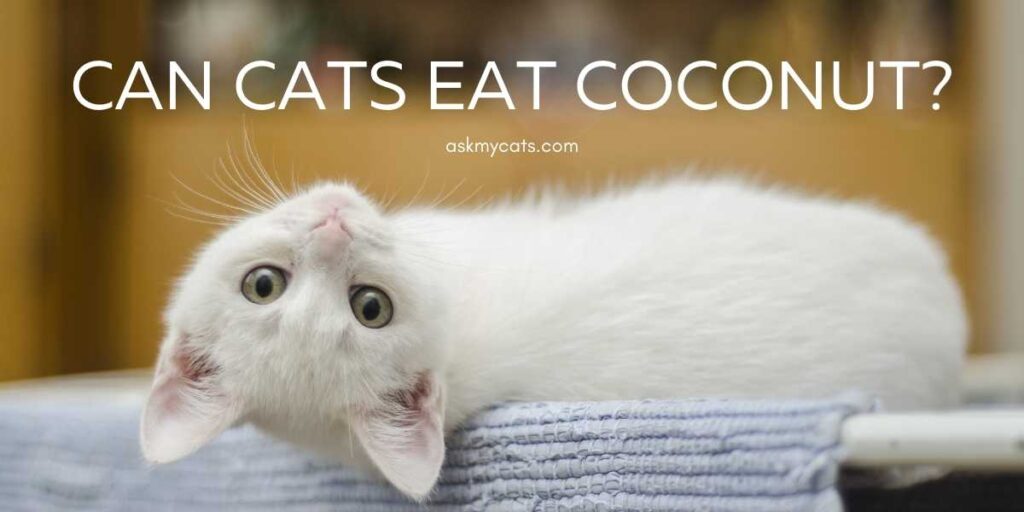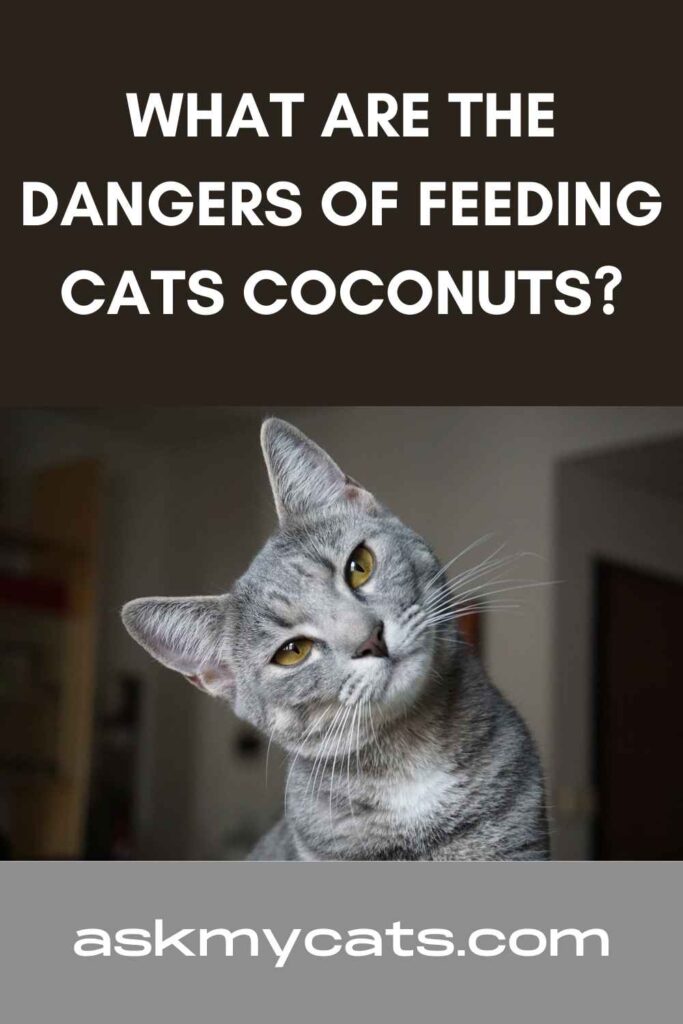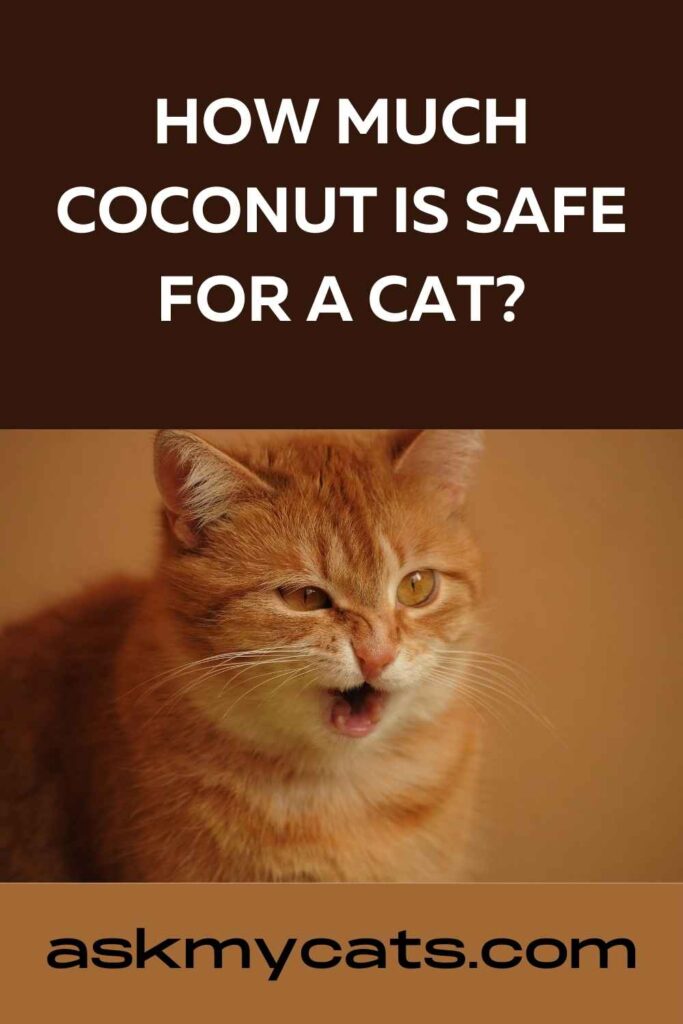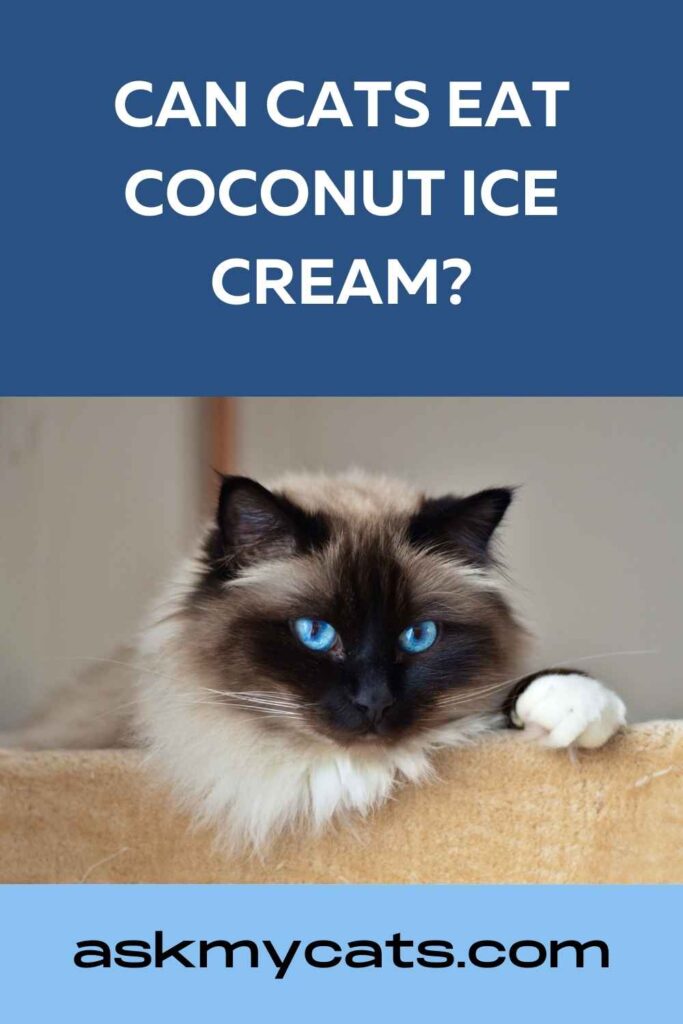Coconuts are a beloved tropical summer staple, appearing in everything from pies to fruity warm-weather drinks. Coconuts are a fruit, nut, and seed all wrapped into one, and once picked from trees, they may be processed into a range of goods ranging from coconut flesh to milk to oil.
Its powerful and invigorating perfume may entice some curious kittens. Can you, however, share some coconut with your cat?
Although coconut is a healthy component for most cats, not all coconut products should be given to your pet. Coconut in its purest form, without sugar or other additions, is the safest (on occasion) and should be used in moderation. It is best to use cold-pressed or virgin coconut oil.


Give Your Cat the Perfect Day
Get the Free Ebook!
Is Coconut Safe For Cats?
For starters, sharing a slice of coconut cream pie isn’t the same as giving your cat some simply crushed coconut shavings.
If you want to give your cat coconut, bear in mind that it must always be the most natural, unprocessed form of coconut because additional sugars and other components can be hazardous to cats.
Coconut is not hazardous to cats, and experts say it’s something they may eat on occasion if they like the taste. So, as long as the danger of diarrhea doesn’t concern you, you may safely give your cat a small amount of coconut every now and again.
What Are The Dangers Of Feeding Cats Coconuts?

There are, of course, certain exceptions to this rule.
First and foremost, always consult with your veterinarian before feeding human food to your cat, since each kitty has unique health requirements, and your veterinarian can advise you on what is best for your specific four-legged pet.
Furthermore, coconut has a high lipid content, and the medium-chain triglycerides (MCT) present in coconuts are not safe in big quantities for cats.
Consuming too much coconut over time can lead to hepatic lipidosis, a disorder that happens in cats when the liver stores too much fat. This illness is serious and can be fatal.
Hyperlipidemia and pancreatitis are two more health issues associated with coconut’s high-fat content. Because coconut is high in calories, it has the potential to cause obesity and other weight-related disorders in cats if consumed on a regular basis.
How Much Coconut Is Safe For A Cat?

Coconut comes in different forms. From its meat to oil, and even flour and milk – coconut is available in many different forms for consumption.
But which kind of coconut food can you give to your cats? And in what quantity?
Coconut Oil
Small amounts of coconut oil in moderated amounts are beneficial for your cat’s overall internal and external health. They can be given coconut oil either orally or topically, i.e., by applying it to their coats. There are different ways you can use coconut oil for cats.
You must like to read about Can Cats Have Coconut Oil & Benefits Of Coconut Oil For Cats
Coconut Meat or Flesh
Coconut meat or flesh should be given in moderated amounts only. It contains high-fat content in the form of medium-chain triglycerides. This ingredient is unhealthy for cats and can cause hepatitis lipidosis when given in excess amounts.
Coconut Water
While a moderate amount of coconut water is unlikely to make your cat sick, a large quantity may trigger an unpleasant response such as diarrhea and stomach troubles.
Check out can cats drink coconut water & is coconut water good for cats
Coconut Milk
Cats lack the enzymes required to digest coconut milk efficiently. This indicates that coconut milk may make your cat sick. Coconuts include additional oils and lipids, which may result in weight gain if your cat consumes coconut milk on a regular basis.
Furthermore, if coconut milk has added sugar, this is an additional element that may only harm cats’ health. Diabetes, dental difficulties, weight gain, and other health issues might develop if you feed your cat sugary foods on a regular basis.
That’s why it is best to not give coconut milk to your cats.
You might also like to read can cats have coconut milk & is coconut milk good for cats
Coconut Flour
It is okay to use as an ingredient in homemade sweet treats, but only in little amounts.
Coconut Rice
Though rice in a limited amount is good for your cat’s digestive system, avoid offering coconut rice since it contains salt and other chemicals that may upset its stomach.
Can Cats Eat Shredded Coconut?
While coconut in its raw form is not exactly toxic, it should be given in limited amounts. Moderation is key here.
Yes, cats can eat shredded coconut – but only in limited amounts.
Some cats have a taste for shredded coconut. They like to snack on it occasionally. It is, however, recommended that you consult your vet before introducing shredded coconut into your cat’s snacks or diet.
Can Cats Eat Coconut Flour?
Yes, cats can eat limited quantities of coconut flour. In fact, coconut flour is used by many pet owners in creating yummy homemade treats for both cats and dogs!
Because coconut flour is high in nutrients, less of it is needed when cooking with it. It is a good source of protein and iron, and it is “low-carb,” meaning it has a low glycemic index (GI).
A higher GI has also been linked to diabetes as well as excess weight in felines (however, sufficient evidence is needed to prove this). The flour has more protein per serving than other standard flour and is gluten-free, making it an excellent alternative for non-meat-eating animals.
So, as long as you maintain moderation in the quantity used, coconut flour can be a healthier alternative for your cat’s favorite treats.
Can Cats Eat Coconut Ice Cream?

Ice cream, in general, is not a recommended food for cats – especially because firstly it has no nutritional value, and secondly since ice creams have a major content of dairy products, it can cause gastrointestinal issues in your cat such as diarrhea.
However, there is no harm in letting your cat have a few licks of coconut ice cream. Just ensure that your cat doesn’t have too much of it as both ice creams in general, and coconut, are ingredients that can cause health issues in cats.
In the wild, felines, being obligate carnivores, rely on animal protein sources such as rodents and small mammals. These foods are high in protein, low in carbs, and moderate in fat. Likewise, their ideal diet must resemble these items.
Ice cream, on the other hand, is heavy in carbs and calories. Aside from being unable to tolerate the high carbohydrates, cats are at risk of weight gain and obesity if they consume extremely calorific diets with calories that are not derived from proteins or fats.
Remember that the metabolism of proteins and lipids, not carbs, is the primary source of energy in these creatures.
You must ensure that the coconut ice cream you intend to serve your kitty companion has no artificial sweeteners. Cats are poisoned by sweets such as xylitol.
Making your own coconut ice cream is the greatest way to ensure your cat enjoys it.
You might also like to read about can cats eat chocolate ice cream
Can Cats Eat Coconut Yogurt?
Coconut yogurt is high in potassium, calcium, and magnesium, which help your cat absorb important vitamins and proteins. It also contains probiotics, which aid in the treatment of intestinal disorders. Coconut yogurt should be OK for your cat to eat once in a while.
Keep in mind, however, that coconut yogurt is lower in protein than dairy yogurt. Only offer them coconut yogurt if they are unable to tolerate dairy yogurt.
Yogurt has a lot of natural bacteria called streptococcus thermophiles that help break down lactose into lactic acid, which your cat should be able to digest easily.
Allow your cat to eat coconut yogurt in moderation. This is especially true if your cat has never eaten yogurt before.
Nonetheless, because it includes potassium, calcium, and magnesium, coconut yogurt can be nutritious and healthful for your cat. Calcium helps your cat’s bones to be stronger, while magnesium helps your cat absorb all of the vital vitamins and proteins.
Coconut yogurt also contains probiotics, which can aid in the treatment of any digestive difficulties your cat may be experiencing. As a result, you should feel free to give your kitty companion some coconut yogurt every now and then; it is perfectly OK.
Frequently Asked Questions
Is yogurt okay for cats?
Non-fat plain yogurt is normally safe and nutritious for cats and dogs to consume as a fun snack; however, check the nutrition label first to ensure it doesn’t include a hazardous substance, such as xylitol. Consider adding a daily probiotic to their regimen for even more potent effects.
Is coconut milk OK for cats to drink?
Although it is not strictly dangerous or hazardous to cats, the amount of oil and fat in coconut milk means that it is not something you should provide to your cat on a daily basis. As usual, consult your regular veterinarian before giving your kitty any human food or drink, including coconut milk.
Final Words
Coconut contains protein and many critical minerals that can aid a cat’s immunological and digestive systems, as well as help with hairballs and poor breath.
Although coconut is a nutritious snack, it is heavy in saturated fats and calories. As a result, it must be provided to your cat with caution to avoid unhealthy weight gain, diarrhea, and other problems.
If your cat has unique nutritional demands or any health problems, please consult with your veterinarian before introducing new foods into your cat’s diet. Some cats, particularly those with pancreatic inflammation or sensitive stomachs, may be sensitive to coconut.
If you want to feed your cat coconut, make sure you do it gradually and in limited quantity.
When we have pets, we must always be vigilant since they are always nibbling or attempting to consume things. It is our responsibility as pet owners to ensure that our pets consume just what is good for them.
